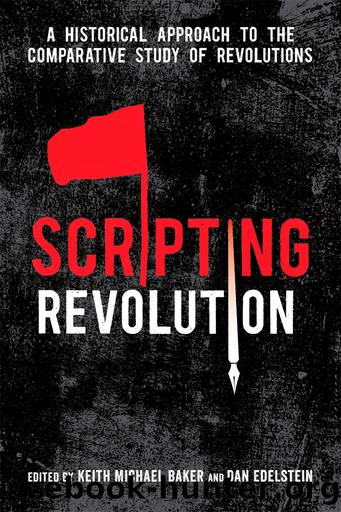Scripting Revolution by Keith Michael Baker

Author:Keith Michael Baker
Language: eng
Format: epub
Publisher: Stanford University Press
Published: 2015-06-15T00:00:00+00:00
Maoâs Little Red Book
The Spiritual Atom Bomb and Its Global Fallout
ALEXANDER C. COOK
Half a century ago, in the midst of the Cold War, there emerged from China an alternative script for revolution with surprisingly broad influence. Quotations from Chairman Mao (Mao Zhuxi yulu), commonly known outside China as the Little Red Book, was for a time the most printed book in the world. Official editions numbered well over a billion copies in three dozen languages, not to mention untold numbers of unofficial local reprints and unofficial translations into more than fifty languages.1 The book was a novel hybrid of two very different genres: the ancient Chinese genre of collected sayings dating back to the Analects of Confucius, and the modern genre of ideological primers embraced especially (but by no means exclusively) by Marxist-Leninists around the world. In addition, the bookâs characteristic physical formâpocket-sized, bright red, clad in sturdy vinylâreflected its origins as an ideological field manual for soldiers of the Chinese military, the Peopleâs Liberation Army (PLA).2 The bookâs contents, composed of 427 extracts from Mao Zedongâs writings and speeches from 1929 to 1964 and arranged into thirty-three thematic chapters, covered an eclectic range of subjects from philosophy to warfare to art.3
A notable feature of this script for revolution was its versatility. Maoâs Little Red Book did not present a linear, coherent argument in the style of a polemic like Marxâs Communist Manifesto. Instead, it provided a basic grammar and vocabulary that could be adapted to diverse circumstances. After Maoâs death, the Little Red Bookâs unsystematic presentation of fragments torn from their historical and textual contexts was dismissed in China as a vulgarization of Maoismânot to mention Marxism. During Maoâs lifetime, however, his quotations were taken quite seriously. In China and elsewhere, the quotations were adapted into many formsâfrom rhetoric, art, and song to talisman, badge, and weaponâand put to use for many purposes. This variety of forms and uses is explored in a volume I have edited called Maoâs Little Red Book: A Global History. This essay will focus on just one aspect of the Little Red Book as script for revolutionânamely, how its sudden and unlikely global influence reflected the circumstances of a particular historical era.
The explanation I offer here arises from a curious interpretation of the quotationsâ power that appeared in the foreword to the authoritative second edition of Quotations from Chairman Mao. The effusive foreword was credited to Lin Biao, Maoâs top military man and tireless promoter of the Little Red Book. It describes how the the written script could become a material force for revolutionâa weapon of mass instruction, the intercontinental delivery system for a potentially world-shattering ideological payload: âOnce Mao Tse-tungâs thought is grasped by the broad masses, it becomes a source of strength and a spiritual atom bomb of infinite power.â4
Lin Biaoâs metaphor was an adulatory exaggeration, of course, but it should not be dismissed as only that. Through an extended exegesis, I will argue that the âspiritual atom bombâ was a coherent concept within its own Maoist intellectual context.
Download
This site does not store any files on its server. We only index and link to content provided by other sites. Please contact the content providers to delete copyright contents if any and email us, we'll remove relevant links or contents immediately.
| Archaeology | Essays |
| Historical Geography | Historical Maps |
| Historiography | Reference |
| Study & Teaching |
Underground: A Human History of the Worlds Beneath Our Feet by Will Hunt(12095)
Sapiens by Yuval Noah Harari(5368)
Navigation and Map Reading by K Andrew(5152)
The Sympathizer by Viet Thanh Nguyen(4387)
Barron's AP Biology by Goldberg M.S. Deborah T(4150)
5 Steps to a 5 AP U.S. History, 2010-2011 Edition (5 Steps to a 5 on the Advanced Placement Examinations Series) by Armstrong Stephen(3731)
Three Women by Lisa Taddeo(3429)
Water by Ian Miller(3181)
The Comedians: Drunks, Thieves, Scoundrels, and the History of American Comedy by Nesteroff Kliph(3077)
Drugs Unlimited by Mike Power(2592)
A Short History of Drunkenness by Forsyth Mark(2294)
DarkMarket by Misha Glenny(2212)
The House of Government by Slezkine Yuri(2203)
And the Band Played On by Randy Shilts(2202)
The Library Book by Susan Orlean(2065)
Revived (Cat Patrick) by Cat Patrick(1991)
The Woman Who Smashed Codes by Jason Fagone(1970)
The Absolutely True Diary of a Part-Time Indian by Sherman Alexie(1911)
Birth by Tina Cassidy(1903)
